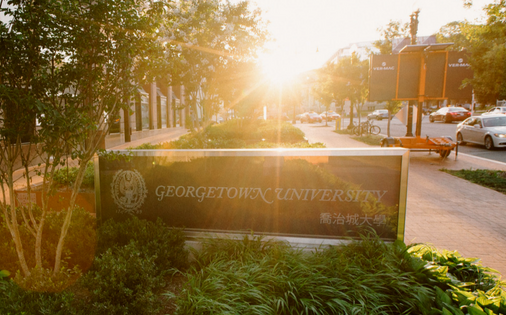The Georgetown University Prisons and Justice Initiative (PJI) is relaunching a partnership with the D.C. Mayor’s Office on Returning Citizen Affairs (MORCA) to prepare formerly incarcerated people for careers as paralegals.
In collaboration with Georgetown University’s School of Continuing Studies (SCS) and the D.C. Department of Employment Services (DOES), the MORCA-Georgetown Paralegal Program will provide students with professional training and work experience in the field of law. This semester, the second class of fellows will complete 12 courses on topics such as legal research and writing, contracts, litigation, ethics and criminal law.

Programs like the MORCA-Georgetown Paralegal Program are important because they empower returning citizens with valuable job skills and experiences, according to SCS Dean Kelly Otter.
“My hope for the program is that we continue to provide a values-based, respectful learning environment: one that empowers returning citizens as they gain new skills and build new professional lives,” Otter wrote in an email to The Hoya. “SCS is proud to support the program by providing its expertise and faculty in the paralegal field.”
The creation of the MORCA-Georgetown Paralegal Program is an embodiment of Georgetown’s value of helping others, according to PJI Director Marc Howard.
“Georgetown has a rich history of service and outreach to incarcerated and formerly incarcerated people,” Howard said. “The university’s value of ‘people for others’ compels us to support our neighbors who are returning or recently returned from incarceration.”
The D.C. Mayor’s Office and the DOES did not respond when contacted by The Hoya.
Following the completion of the 16-week program in December, fellows will earn a certificate in paralegal studies from the SCS and will be matched with one-year paid fellowship positions at law firms, nonprofits and government agencies.
The fellowship programs offer employment opportunities not typically available to returning citizens, according to Marcus Dantley, a fellow in this semester’s program.
“These programs are monumental for returning citizens because the potential places of employment are degrading for individuals with little to no experience, certifications, or skills,” Dantley wrote in an email to The Hoya. “When I learned I was selected, it truly felt like I earned it.”
Formerly incarcerated people in the United States often face higher barriers to employment. Returning citizens have a 27% unemployment rate — nearly five times higher than the general public’s unemployment. Up to 60% of formerly incarcerated individuals remain unemployed one year after their release, while some begin jobs in the food service industry, construction or warehouse operations.
The MORCA-Georgetown Paralegal Program helps fellows overcome employment challenges that are typical for returning citizens, according to Howard.
“Many returning citizens find themselves taking the first job they can find to make ends meet,” Howard wrote in an email to The Hoya. “This program is an opportunity for students to invest their time in building the skills and networks they need, and it also provides a direct link to paid, full-time employment.”
Nine students graduated in the first cohort in the 2018-19 year, and most were hired to permanent positions after their one-year fellowships. Five graduates also returned to the program to help mentor current participants and provide guidance based on their experiences.
However, even though they have academic support and mentors within the program, formerly incarcerated individuals still have a hard transition back into the workforce and classroom, according to Dantley.
“Some of the biggest challenges are readjusting to a different way of doing things,” Dantley wrote. “It’s very hard to go from survival mode surrounded by predators to study mode surrounded by nerds.”
Still, despite the difficult transition, the MORCA-Georgetown Paralegal Program has a great impact in helping returning citizens develop new skills and implement them in fields they choose, according to Howard.
“Returning citizens represent a wealth of knowledge and leadership that is so often underutilized,” Howard said. “Initiatives like the Pivot Program and the Paralegal Program create an opportunity for participants to overcome some of the barriers they face and build the kind of future they want for themselves.”















Carolyn Griffin • Oct 29, 2021 at 1:46 pm
What an extraordinary program being offered by Georgetown. To offer the training, then arrange for paid internships, and then for some to even return to mentor the next class. This program should be replicated across the country. Would certainly reduce the recidivism rate and ultimately reduce the incarcerated. Congratulations to Georgetown and all involved in providing this vital service.